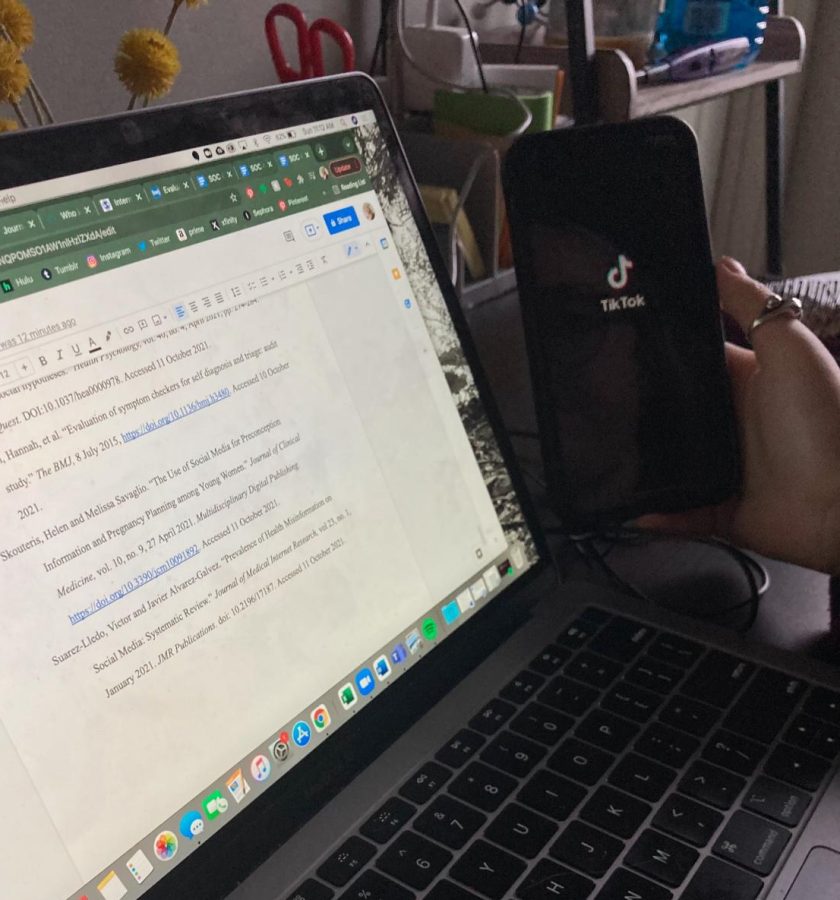Is TikTok shrinking students’ attention spans?
The average TikTok user in the U.S. spends an hour and eight minutes on the app a day. The app can be distracting for high school and college students.
The average TikTok user in the U.S. spends an hour and eight minutes on the app a day, according to a recent study from Business of Apps. Michigan State University senior Kelsi Karpinski’s watch time is even higher than the national average. One of the 1 billion monthly active users worldwide Karpinski clocks an average of an hour and 31 minutes on the app every day.
Karpinski likes the short duration of the videos on TikTok because if a video is longer than 40 or 45 seconds, she “gets bored.” Since downloading the app in summer of 2019, it has become a distraction to her, both during leisure time and while doing homework.
“I used to watch TV shows on my own, but [now] if I’m just watching it on my own, I can’t pay attention anymore because I get really distracted and I go on my phone,” Karpinski says. “I’ll literally pull up TikTok when I’m watching a show and I’m like ‘Hm, can’t hear both of them.’”
Initially launched in September of 2016, TikTok started out as a video sharing platform where dancing and lip-syncing videos got the most views. The app has since developed to include a wider variety of content, from story-telling to art videos to comedy skits to fashion shows to Karpinski’s personal favorite, cooking videos.
Karpinski is certainly not alone in the struggle to stay off TikTok, one that persists especially among high school and college students — 28% of users are under the age of 18 and 35% of users are ages 19-29, reports Business of Apps. But with all this time spent on TikTok, how is it affecting students mentally, and particularly, how is it affecting their attention spans?
Let’s start with how TikTok works. The app’s home page has two tabs: one for accounts that the user follows and the other is called the “For You Page” (FYP). The FYP recommends videos specifically to the user based on multiple factors such as “interests you express as a new user and adjusting for things you indicate you’re not interested in, too,” per Tiktok’s website.
With a constant stream of new videos ranging from 15 seconds to three minutes, users focus on a stimulus for a short period of time before moving onto the next video — which the app generates for them — by simply scrolling down.
Steve Kelman from The Business of Federal Technology hypothesizes the result of this passive scrolling is a shortened attention span.
“And short attention spans, with concomitant weakened ability to concentrate, can in turn produce a number of negative effects, such as poor performance at work or school, inability to complete daily tasks, missing important details or information and difficulties communicating in relationships,” Kelman writes.
The research on TikTok’s impact on attention span specifically, however, has yet to be developed.
A 2013 study by the National Center for Biotechnology Information found that the average human attention span had dropped from 12 seconds in the year 2000 to eight seconds in 2013. The cause of that change, though, might not be as cut-and-dry as just social media.
Kimberly Bernock, MSW, LLMSW is a psychotherapist who works with people of ages 12 and older with conditions such as attention deficit hyperactivity disorder (ADHD), depression, anxiety, obsessive-compulsive disorder (OCD), trauma history, substance abuse, stress management, grief and loss. Many of her high school and college-aged patients are TikTok users, among other social medias.
“Humans have an issue with delayed gratification in general — oftentimes, naturally, social media is something where you’d expect to see the punchline right away,” Bernock says. “The reason they [many of my patients] love TikTok is because they’re getting that instant gratification very quickly on every short video that they’re scrolling through.”
The need for instant gratification, explains Bernock, is a common pleasure-seeking behavior that can apply to other activities as well, such as shopping or pursuing relationships — a sort of behavior that can be distracting.
Bernock also says there are a variety of conditions that may impact attention and concentration, and she stresses that correlation does not necessarily mean causation.
“Depression and anxiety are very common among that age group, so naturally that’s also going to impact their attention and concentration,” Bernock says. “Same thing with their history of coping skills, and generally, social media is one of the most common coping skills that I’ve seen people use.”
According to Bernock, oftentimes when people are trying to gain a sense of control over something they’re struggling with, whether it’s a mental health condition or a stressful life circumstance, they try to find something that makes them feel stable and grounded, and social media — which connects people and makes them laugh — is often used to do that.
“Social media is definitely one of those things that can impact it [attention span], but it’s a multifaceted issue,” Bernock says.
According to numerous studies collected by Harvard University, cell phones in general can certainly be distracting for students, as Karpinski could attest to. Harvard also compiled a series of survey results that showed that many college students are prone to using their phones during class.
“Humans are incredibly bad at multitasking,” says Associate Professor of Psychology at Oakland University Melissa McDonald, Ph.D. “In that respect, the presence of our phone while we’re trying to study or while we’re trying to work is kind of like a multitasking situation because it leads us to divide our attention and think about what sort of notifications might be coming through.”
“I think it might not be rewiring our brains completely, or it might be — both are plausible hypotheses — but I do think that social media is incredibly distracting for people, and it makes people less efficient and productive in their work or study.”








